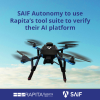Platform Support Packages are required to support software analysis by zero-footprint RVS tools. They interface between the tools and the platform in order to do the following:
- Convert the specific format of native branch traces generated by the platform into a format that the RVS tool understands and can use for subsequent analysis.
- Disassemble the object code to understand the structure and control flow of the code so this can be used for subsequent analysis.
Each PSP is designed to support various components of a platform. These include:
- The compiler(s) used to generate executables
- The instruction set of object code to be analyzed
- The native branch trace format generated from the platform – this depends on the mechanism used to generate branch traces, which may be the target hardware (or simulator) or a third-party device e.g. debugger.
- The real-time operating system.
Different PSPs are needed to support analysis by zero-footprint RVS tools when any of the above items are different between two platforms. For more information on how PSPs support analysis by zero-footprint RVS tools, see our Requirements for zero-footprint RVS analysis Technical note.

 Rapita System Announces New Distribution Partnership with COONTEC
Rapita System Announces New Distribution Partnership with COONTEC
 Rapita partners with Asterios Technologies to deliver solutions in multicore certification
Rapita partners with Asterios Technologies to deliver solutions in multicore certification
 SAIF Autonomy to use RVS to verify their groundbreaking AI platform
SAIF Autonomy to use RVS to verify their groundbreaking AI platform
 RVS gets a new timing analysis engine
RVS gets a new timing analysis engine
 How to measure stack usage through stack painting with RapiTest
How to measure stack usage through stack painting with RapiTest
 What does AMACC Rev B mean for multicore certification?
What does AMACC Rev B mean for multicore certification?
 How emulation can reduce avionics verification costs: Sim68020
How emulation can reduce avionics verification costs: Sim68020
 How to achieve multicore DO-178C certification with Rapita Systems
How to achieve multicore DO-178C certification with Rapita Systems
 How to achieve DO-178C certification with Rapita Systems
How to achieve DO-178C certification with Rapita Systems
 Certifying Unmanned Aircraft Systems
Certifying Unmanned Aircraft Systems
 DO-278A Guidance: Introduction to RTCA DO-278 approval
DO-278A Guidance: Introduction to RTCA DO-278 approval
 NXP's MultiCore for Avionics (MCFA) Conference
NXP's MultiCore for Avionics (MCFA) Conference
 Embedded World 2026
Embedded World 2026
 XPONENTIAL 2026
XPONENTIAL 2026
 DO-178C Multicore In-person Training (Heathrow)
DO-178C Multicore In-person Training (Heathrow)










